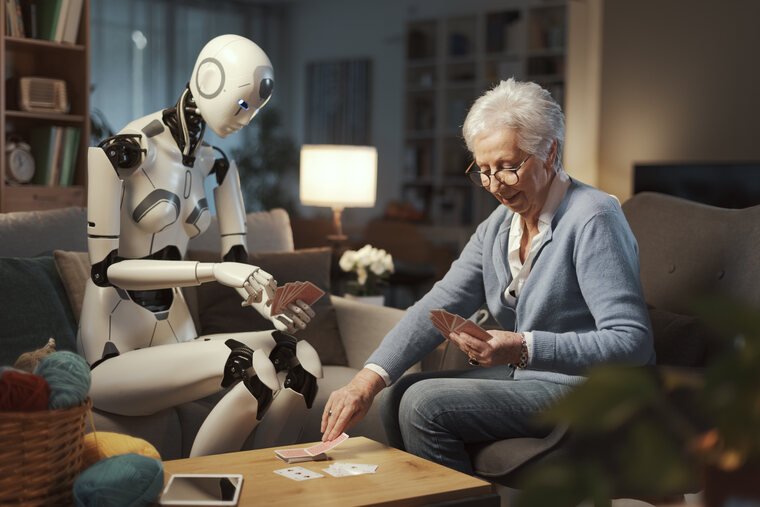Companion robots equipped with artificial intelligence (AI) hold the potential to alleviate the growing loneliness epidemic, according to a new report released by researchers from Auckland, Duke, and Cornell Universities.
Published in the latest issue of Science Robotics, the report sheds light on the ethical considerations surrounding companion robots and emphasizes the urgent need for governments, policymakers, technologists, and clinicians to collaborate to develop comprehensive guidelines regarding trust, agency, engagement, and real-world efficacy.
Furthermore, the report introduces a novel approach to measuring the effectiveness of companion robots in assisting individuals.
“Until society prioritizes social connectedness and eldercare, robots can provide a solution for the millions of isolated individuals who have no other alternatives,” Dr. Murali Doraiswamy, a professor of psychiatry and geriatrics at Duke University Brain Sciences, said in a press release.
Research indicates that the number of Americans without close friends has quadrupled since 1990, a trend mirrored globally.
Loneliness and social isolation affect approximately one-third of the world’s population, leading to severe health consequences such as an increased risk of mental illness, obesity, dementia, and premature death. U.S. Surgeon General Vivek H. Murthy, M.D., has even suggested that loneliness may be as detrimental to health as smoking cigarettes.
Given the challenges of forming new friendships in adulthood, researchers say utilizing companion robots to support socially isolated older adults is a promising solution.
“AI presents exciting opportunities to equip companion robots with enhanced social skills,” said Dr. Elizabeth Broadbent, a professor of psychological medicine.
The world’s aging population continues to grow and significantly outpace the number of available caregivers, and research has shown that people 65 and over are increasingly living alone.
This is especially prevalent in nations like Japan, where people 65 and over account for nearly one-third (28.9%) of the total population. In the United States, the percentage of people 65 or older is expected to rise to roughly 26% by 2050. With continued medical advances, the global elderly population is only expected to increase.
Because of this trend, many futurists have long been saying that AI companion robots will become one of the most significant technological industries in the decades to come.
Rather than taking over the world, as shown in many popular science fiction films, technologists like, Alec Ross, the former Senior Advisor for Innovation to the Secretary of State, believe AI and robotics will be used to fill jobs created by disproportionate age gaps in societies.
“[The] labor shortage will hit service-industry jobs like eldercare with ferocity and will be exacerbated because caretakers have a high job turnover rate due to low pay and high rates of work-related injury from lifting patients,” Ross writes in The Industries of The Future. “Enter the robots.”
Social robots like ElliQ have already engaged in thousands of interactions with human users, with nearly half focusing on companionship. A growing body of research suggests that companion robots can effectively reduce stress and loneliness while enabling older individuals to maintain an active and healthy lifestyle within their homes.
Recent advancements in AI technology embedded in newer-generation robots offer the potential for even stronger social connections with humans. Generative AI, exemplified by ChatGPT, a large language model, empowers robots to engage in spontaneous conversations and even replicate the voices of deceased loved ones, fostering a more profound sense of companionship.
Researchers note that the medical community has also shown considerable support for companion robots. A Sermo survey involving 307 healthcare providers across Europe and the United States revealed that 69% of physicians agreed that social robots could provide companionship, alleviate isolation, and potentially enhance patients’ mental well-being.
Seventy percent of doctors also believed that insurance companies should cover the costs of companion robots if their effectiveness as friendship supplements is proven.
Nevertheless, the challenge lies in accurately measuring the impact of these robots.
The absence of standardized metrics underscores the need to develop patient-rated outcome measures, such as the “Companion Robot Impact Scale” (Co-Bot-I-7), currently being developed by the report’s authors.
This scale aims to assess the impact of companion robots on physical health and loneliness and has already demonstrated promising results. For instance, early findings suggest that companion robots can effectively reduce stress and promote skin healing in the case of minor wounds.
The convergence of AI and robotics offers unprecedented potential to address the pressing issue of loneliness while significantly improving the well-being of isolated individuals.
Report authors believe that by taking proactive steps towards responsible development and implementation, society can embrace the future of companion robots as a valuable tool in fostering social connections and combating the pervasive loneliness epidemic.
Researchers, however, underscore that caution must be exercised to establish ethical rules ensuring the morality and trustworthiness of these robots.
“With the right ethical guidelines,” conclude the authors, “we may be able to build on current work to use robots to create a healthier society.”
Tim McMillan is a retired law enforcement executive, investigative reporter and co-founder of The Debrief. His writing typically focuses on defense, national security, the Intelligence Community and topics related to psychology. You can follow Tim on Twitter: @LtTimMcMillan. Tim can be reached by email: tim@thedebrief.org or through encrypted email: LtTimMcMillan@protonmail.com

